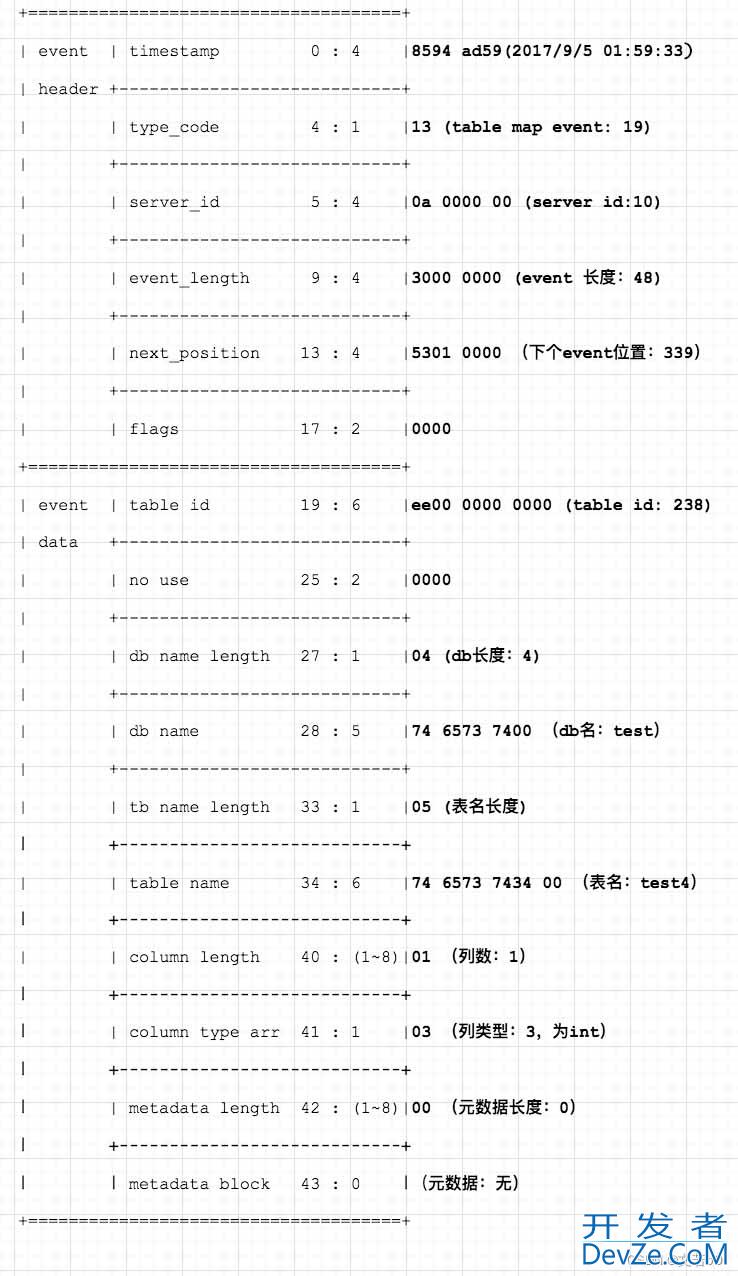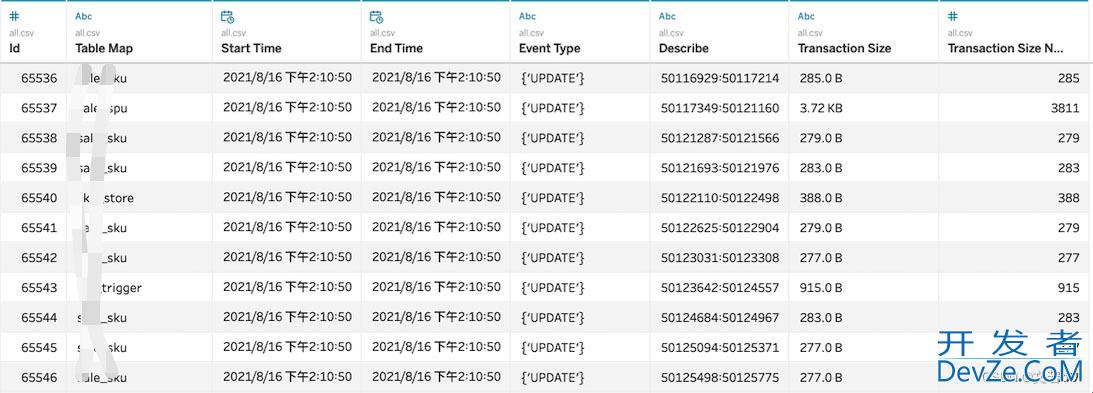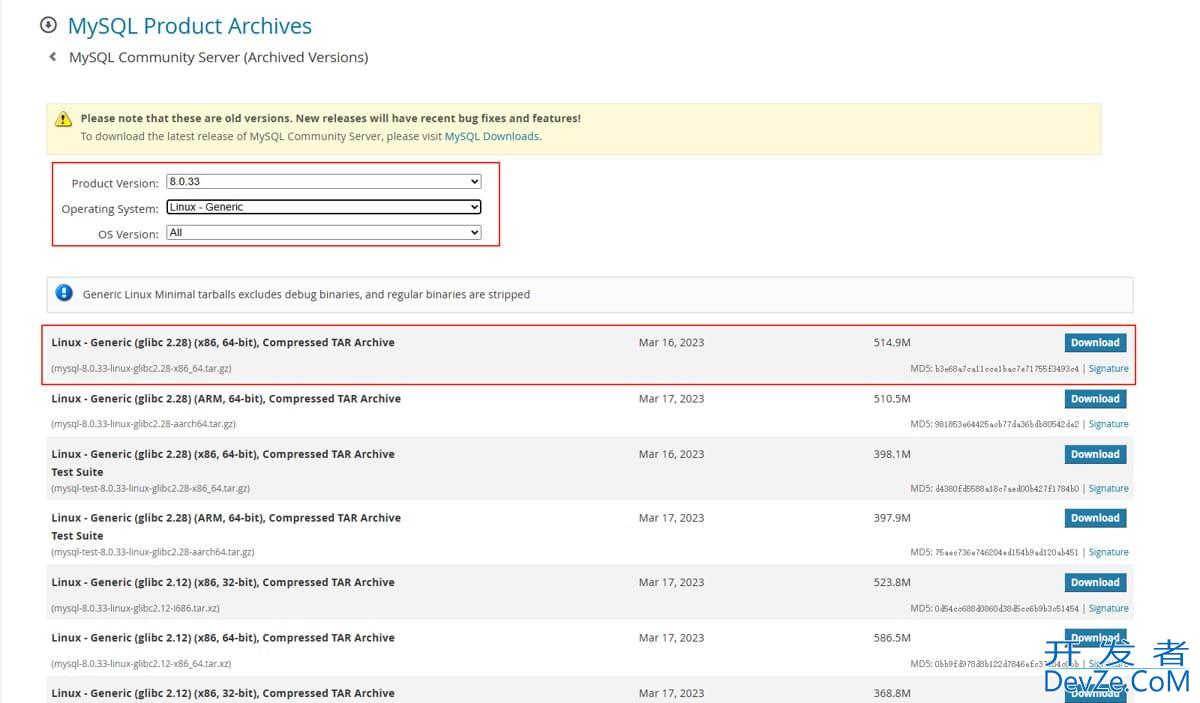Python解析MySQL Binlog日志分析情况
目录
- python解析mysql Binlog日志分析情况
- 1. 分析目的
- 2. 代码逻辑
- 3. 实战分析
- 总结
Python解析MySQL Binlog日志分析情况
1. 分析目的
Binlog 中记录了 MySQL 数据变动,经常用于时间点恢复、数据闪回、分析一些 “奇怪” 的问题。
例如是否有大事务,哪张表涉及的更新最多?是否有一些事务没有及时提交,都可以通过分析 binlog 来得到答案。
2. 代码逻辑
收集数据的第一步就是要解析 binlog 文件,binlog 是由事件组成的,例如:GTID 事件、XID 事件、Table Map 事件、DML 事件,只要获得所有的事件,就可以分析到很多东西。
每个事件都由两部分组成,事件头 - 事件体,事件头的存储格式是这样的。
| 类型 | 占用 |
|---|---|
| timestamp | 4 bytes |
| type_code | 1 bytes |
| server_id | 4 bytes |
| event_length | 4 bytes |
| next_position | 4 bytes |
| flags | 2 bytes |
一共占 19 bytes 我们通过 header 可以知道事件类型,发生时间、事件长度、下一个事件开始位置。
读取头信息后,我们就可以通过 next_position 跳到下一个事件开始的位置,读取事件头,如果遇到 Table_map 事件则表示要开启一个 DML 事务,那么 Table Map 事件中存储的是什么呢?

从 Table Map 中可以获得 DML 要操作的数据库与表信息,这样我们就可以定位到 DML 操作的是哪张表,开启一个事务时,binlog 会先记录 Table_map 事件,涉及到多张表就会有多个 Table_map 事件,然后就是 DML 事件,最后是一个 XID 事件,表示事务提交。
脚本通过解析 Query_event 获得事务的起点,解析 Table map 事件获得涉及的表,通过 XID 事件获得事务结束。
3. 实战分析
直接上代码吧~
需要安装 pandas 模块,这个模块处理数据非常方便,如果没有使用过的朋友,建议去把玩下,用好了提升工作效率。
# -*- coding: utf-8 -*-
import sys
import math
import time
import struct
import argparse
import pandas as pd
from datetime import datetime
binlog_quer_event_stern = 4
binlog_event_fix_part = 13
table_map_event_fix_length = 8
BINLOG_FILE_HEADER = b'\xFE\x62\x69\x6E'
binlog_event_header_len = 19
class BinlogEvent:
UNKNOWN_EVENT = 0
START_EVENT_V3 = 1
QUERY_EVENT = 2
STOP_EVENT = 3
ROTATE_EVENT = 4
INTVAR_EVENT = 5
LOAD_EVENT = 6
SLAVE_EVENT = 7
CREATE_FILE_EVENT = 8
APPEND_block_EVENT = 9
EXEC_LOAD_EVENT = 10
DELETE_FILE_EVENT = 11
NEW_LOAD_EVENT = 12
RAND_EVENT = 13
USER_VAR_EVENT = 14
FORMAT_DESCRIPTION_EVENT = 15
XID_EVENT = 16
BEGIN_LOAD_QUERY_EVENT = 17
EXECUTE_LOAD_QUERY_EVENT = 18
TABLE_MAP_EVENT = 19
PRE_GA_WRITE_ROWS_EVENT = 20
PRE_GA_UPDATE_ROWS_EVENT = 21
PRE_GAzpMxEiZd_DELETE_ROWS_EVENT = 22
WRITE_ROWS_EVENT = 23
UPDATE_ROWS_EVENT = 24
DELETE_ROWS_EVENT = 25
INCIDENT_EVENT = 26
HEARTBEAT_LOG_EVENT = 27
IGNORABLE_LOG_EVENT = 28
ROWS_QUERY_LOG_EVENT = 29
WRITE_ROWS_EVENT_V2 = 30
UPDATE_ROWS_EVENT_V2 = 31
DELETE_ROWS_EVENT_V2 = 32
GTID_LOG_EVENT = 33
ANONYMOUS_GTID_LOG_EVENT = 34
PREVIOUS_GTIDS_LOG_EVENT = 35
class BinlogEventGet(object):
def __init__(self, binlog_path, www.devze.comoutfile_path):
self.file_handle = open(binlog_path, 'rb')
# 分析文件导出的位置
self.outfile_path = outfile_path
def __del__(self):
self.file_handle.close()
def read_table_map_event(self, event_length, next_position):
"""
fix_part = 8
table_id : 6bytes
Reserved : 2bytes
variable_part:
database_name_length : 1bytes
database_name : database_name_length bytes + 1
table_name_length : 1bytes
table_name : table_name_length bytes + 1
cloums_count : 1bytes
colums_type_array : one byte per column
mmetadata_lenth : 1bytes
metadata : .....(only available in the variable length field,varchar:2bytes,text、blob:1bytes,time、timestamp、datetime: 1bytes
blob、float、decimal : 1bytes, char、enum、binary、set: 2bytes(column type id :1bytes metadatea: 1bytes))
bit_filed : 1bytes
crc : 4bytes
.........
:return:
"""
self.read_bytes(table_map_event_fix_length)
database_name_length, = struct.unpack('B', self.read_bytes(1))
database_name, _a, = struct.unpack('{}ss'.format(database_name_length),
self.read_bytes(database_name_length + 1))
table_name_length, = struct.unpack('B', self.read_bytes(1))
table_name, _a, = struct.unpack('{}ss'.format(table_name_length), self.read_bytes(table_name_length + 1))
self.file_handle.seek(next_position, 0)
return database_name, table_name
def read_bytes(self, count):
"""
读取固定 bytes 的数据
:param count:
:return:
"""
return self.file_handle.read(count)
def main(self):
if not self.read_bytes(4) == BINLOG_FILE_HEADER:
print("Error: Is not a standard binlog file format.")
sys.exit(0)
# 事务记录字典
temp_transaction_dict = {
'id': None,
'db_name': None,
'ld_table_name': None,
'table_set': set(),
'start_time': None,
'end_time': None,
'diff_second': None,
'event_type': set(),
'start_position': None,
'end_position': None
}
tem_id = 0
df = list()
start_position, end_position = None, None
print('loading.....')
while True:
type_code, event_length, timestamp, next_position = self.read_header()
# 终止循环判断
if type_code is None:
break
# 事务信息收集逻辑判断
if type_code == BinlogEvent.QUERY_EVENT:
thread_id, db_name, info = self.read_query_event(event_length)
if info == 'BEGIN':
temp_transaction_dict['start_position'] = next_position - event_length
temp_transaction_dict['start_time'] = timestamp
temp_transaction_dict['db_name'] = db_name
# print('Time:', timestamp, 'DB:', db_name, 'SQL:', info)
self.file_handle.seek(next_position, 0)
elif type_code == BinlogEvent.TABLE_MAP_EVENT:
with_database, with_table = self.read_table_map_event(event_length, next_position)
# 只记录最开始的一张表
if temp_transaction_dict['ld_table_name'] is None:
temp_transaction_dict['ld_table_name'] = str(with_table.decode())
# 一个事务涉及的所有表集合
temp_transaction_dict['table_set'].add(str(with_table.decode()))
elif type_code in (BinlogEvent.WRITE_ROWS_EVENT, BinlogEvent.WRITE_ROWS_EVENT_V2):
# print('INSERT:', type_code, event_length, timestamp, next_position)
temp_transaction_dict['event_type'].add('INSERT')
self.file_handle.seek(event_length - binlog_event_header_len, 1)
elif type_code in (BinlogEvent.UPDATE_ROWS_EVENT, BinlogEvent.UPDATE_ROWS_EVENT_V2):
# print('UPDATE:', type_code, event_length, timestamp, next_position)
temp_transaction_dict['event_type'].add('UPDATE')
self.file_handle.seek(event_length - binlog_event_header_len, 1)
elif type_code in (BinlogEvent.DELETE_ROWS_EVENT, BinlogEvent.DELETE_ROWS_EVENT_V2):
# print('DELETE:', type_code, event_length, timestamp, next_position)
temp_transaction_dict['event_type'].add('DELETE')
self.file_handle.seek(event_length - binlog_event_header_len, 1)
elif type_code == BinlogEvent.XID_EVENT:
# 补充事务结束信息
temp_transaction_dict['id'] = tem_id
temp_transaction_dict['end_time'] = timestamp
temp_transaction_dict['end_position'] = next_position
_start = datetime.strptime(temp_transaction_dict['start_time'], '%Y-%m-%d %H:%M:%S')
_end = datetime.strptime(temp_transaction_dict['end_time'], '%Y-%m-%d %H:%M:%S')
temp_transaction_dict['diff_second'] = (_end - _start).seconds
df.append(temp_transaction_dict)
# print(temp_transaction_dict)
# 收尾
temp_transaction_dict = {
'id': None,
'db_name': None,
'ld_table_name': None,
'table_set': set(),
'start_time': None,
'end_time': None,
'diff_second': None,
'event_type': set(),
'start_position': None,
'end_position': None
}
self.fizpMxEiZdle_handle.seek(event_length - binlog_event_header_len, 1)
tem_id += 1
else:
# 如果读取的是一个 header 事件,直接跳过即可。
self.file_handle.seek(event_length - binlog_event_header_len, 1)
outfile = pd.DataFrame(df)
outfile['transaction_size_bytes'] = (outfile['end_position'] - outfile['start_position'])
outfile["transaction_size"] = outfile["transaction_size_bytes"].map(lambda x: self.bit_conversion(x))
outfile.to_csv(self.outfile_path, encoding='utf_8_sig')
print('File Export directory: {}'.format(self.outfile_path))
print(android'complete ok!')
def read_header(self):
"""
binlog_event_header_len = 19
timestamp : 4bytes
type_code : 1bytes
server_id : 4bytes
event_length : 4bytes
next_position : 4bytes
flags : 2bytes
"""
read_byte = self.read_bytes(binlog_event_header_len)
if read_byte:
result = struct.unpack('=IBIIIH', read_byte)
type_code, event_length, timestamp, next_position = result[1], result[3], result[0], result[4]
return type_code, event_length, time.strftime('%Y-%m-%d %H:%M:%S',
time.localtime(
timestamp)), next_position
else:
return None, None, None, None
def read_query_event(self, event_length=None):
"""
fix_part = 13:
thread_id : 4bytes
execute_seconds : 4bytes
database_length : 1bytes
error_code : 2bytes
variable_block_length : 2bytes
variable_part :
variable_block_length = fix_part.variable_block_length
database_name = fix_part.database_length
sql_statement = event_header.event_length - 19 - 13 - variable_block_length - database_length - 4
"""
read_byte = self.read_bytes(binlog_event_fix_part)
fix_result = struct.unpack('=IIBHH', read_byte)
thread_id = fix_result[0]
self.read_bytes(fix_result[4])
read_byte = self.read_bytes(fix_result[2])
database_name, = struct.unpack('{}s'.format(fix_result[2]), read_byte)
statement_length = event_length - binlog_event_fix_part - binlog_event_header_len \
- fix_result[4] - fix_result[2] - binlog_quer_event_stern
read_byte = self.read_bytes(statement_length)
_a, sql_statement, = struct.unpack('1s{}s'.format(statement_length - 1), read_byte)
return thread_id, database_name.decode(), sql_statement.decode()
@staticmethod
def bit_conversion(size, dot=2):
size = float(size)
if 0 <= size < 1:
human_size = str(round(size / 0.125, dot)) + ' b'
elif 1 <= size < 1024:
human_si编程客栈ze = str(round(size, dot)) + ' B'
elif math.pow(1024, 1) <= size < math.pow(1024, 2):
human_size = str(round(size / math.pow(1024, 1), dot)) + ' KB'
elif math.pow(1024, 2) <= size < math.pow(1024, 3):
human_size = str(round(size / math.pow(1024, 2), dot)) + ' MB'
elif math.pow(1024, 3) <= size < math.pow(1024, 4):
human_size = str(round(size / math.pow(1024, 3), dot)) + ' GB'
elif math.pow(1024, 4) <= size < math.pow(1024, 5):
human_size = str(round(size / math.pow(1024, 4), dot)) + ' TB'
elif math.pow(1024, 5) <= size < math.pow(1024, 6):
human_size = str(round(size / math.pow(1024, 5), dot)) + ' PB'
elif math.pow(1024, 6) <= size < math.pow(1024, 7):
human_size = str(round(size / math.pow(1024, 6), dot)) + ' EB'
elif math.pow(1024, 7) <= size < math.pow(1024, 8):
human_size = str(round(size / math.pow(1024, 7), dot)) + ' ZB'
elif math.pow(1024, 8) <= size < math.pow(1024, 9):
human_size = str(round(size / math.pow(1024, 8), dot)) + ' YB'
elif math.pow(1024, 9) <= size < math.pow(1024, 10):
human_size = str(round(size / math.pow(1024, 9), dot)) + ' BB'
elif math.pow(1024, 10) <= size < math.pow(1024, 11):
human_size = str(round(size / math.pow(1024, 10), dot)) + ' NB'
elif math.pow(1024, 11) <= size < math.pow(1024, 12):
human_size = str(round(size / math.pow(1024, 11), dot)) + ' DB'
elif math.pow(1024, 12) <= size:
human_size = str(round(size / math.pow(1024, 12), dot)) + ' CB'
else:
raise ValueError('bit_conversion Error')
return human_size
if __name__ == '__main__':
parser = argparse.ArgumentParser(description='A piece of binlog analysis code.')
parser.add_argument('--binlog', type=str, help='Binlog file path.', default=None)
parser.add_argument('--outfile', type=str, help='Analyze the file export directory.', default=None)
args = parser.parse_args()
if not args.binlog or not args.outfile:
parser.print_help()
sys.exit(0)
binlog_show = BinlogEventGet(args.binlog, args.outfile)
binlog_show.main()
➜ Desktop python3 BinlogShow.py --help usage: BinlogShow.py [-h] [--binlog BINLOG] [--outfile OUTFILE] A piece of binlog analysis code. optional arguments: -h, --help show this help message and exit --binlog BINLOG Binlog file path. --outfile OUTFILE Analyze the file export directory. ➜ Desktop
指定 binlog 文件目录和导出分析文件目录即可。
➜ Desktop python3 BinlogShow.py --binlog=/Users/cooh/Desktop/mysql-bin.009549 --outfile=/Users/cooh/Desktop/binlogshow.csv loading..... File Export directory: /Users/cooh/Desktop/binlogshow.csv complete ok!
运行完成后就会得到程序解析后的信息,我们根据这份文件,写一些分析代码即可。

总结
以上为个人经验,希望能给大家一个参考,也希望大家多多支持编程客栈(www.devze.com)。








 加载中,请稍侯......
加载中,请稍侯......
精彩评论